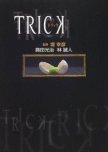
Please do not allow the hospital setting to frighten you away. Despite how one might find Shiroi Kage described, romance stands at its essential core. There are no episodic cases to suffer through, but rather three long term ones; each is a parallel to or foreshadowing element for the main plot. This then centers on the growing love between a secretive, Byronic doctor and the gentle nurse he first met—as if destined—at a riverbank beloved by both of them. Fear bars the way to happiness, but something direr might be lurking to separate the two forever. And no: it isn’t a family member, birth secret, or anything that springs up on you out of left field. The cues are laid out on the table early on, leaving the viewer to an involving “will they, won’t they?” that will leave one saying “Please do!” regardless of perceived consequences.
The couple in this series truly touched me. It helps that the drama itself seemed to indulge my desires in certain things. If I was think-shouting something (“Go after her!,” “Hold her, fool!” “He’ll be there when she turns around, watch,”) often it would come to pass. So many scenes between the two are memorable, enough that this series might have the most of any romance I've seen to date. Whether at the river or dredging up transient dandelions, I doubt I’ll forget any of them soon. Some even made me cry (just ask the poor friend who had to listen to my sniveling). There’s a certain feeling reminiscent of classic romance literature—specific character types, big emotion, grand gestures, ambitious theme combinations. But more than anything, through this pair, viewers will experience an elegant passage across the delicate issues of love, life, and death.
Shiroi Kage marks my second drama with both leads, Nakai Masahiro (Naoe-sensei) and Takeuchi Yuko (Noriko). As pleasurable as each first meeting was, in seeing them together I can be sure in my enjoyment of both. Here Nakai-san plays the type that weakens my knees—Byronic, dark, but loving and even vulnerable. He’s very much the “white shadow” of the title, both figuratively and literally; he wears a white lab coat, and is a decent person who seems to be hiding behind his own emotional darkness. Perhaps Nakai doesn't match my taste physically, but that never once stopped me from finding Naoe-sensei attractive. Takeuchi-san plays a character that snaps together wonderfully with the puzzle piece that is Naoe-sensei, but cannot be called complicated herself. Her Noriko is almost stunningly adorable and easy to like, yet she also exemplifies the female lead who often accompanies the Byronic hero. She is sweet, pure, constant, and a little bland—though there are moments of brilliance from the excellent Takeuchi-san. The rest of the cast does well enough, though I hate to say it: with the lead couple wonderful as they are, you may not notice much else.
I enjoyed the music for the most part. Though some of it is a bit dated, almost everything fits as it ought and the scenes are tied together nicely. My favorite instances are both vocals. First, the use of Neil Sedaka’s classic “Solitaire” was a genius choice. I cannot remember the last time I’ve heard an English song so well-utilized in a drama. Second is Shiroi Kage’s own theme: Mayonaka no Nightingale (“Midnight Nightingale”) sung with bittersweet passion by Takeuchi Mariya. The outro video which accompanies this song is exquisite—I caught it before ever starting the drama, and was impressed enough to expedite my watch plans.
Esta resenha foi útil para você?









































